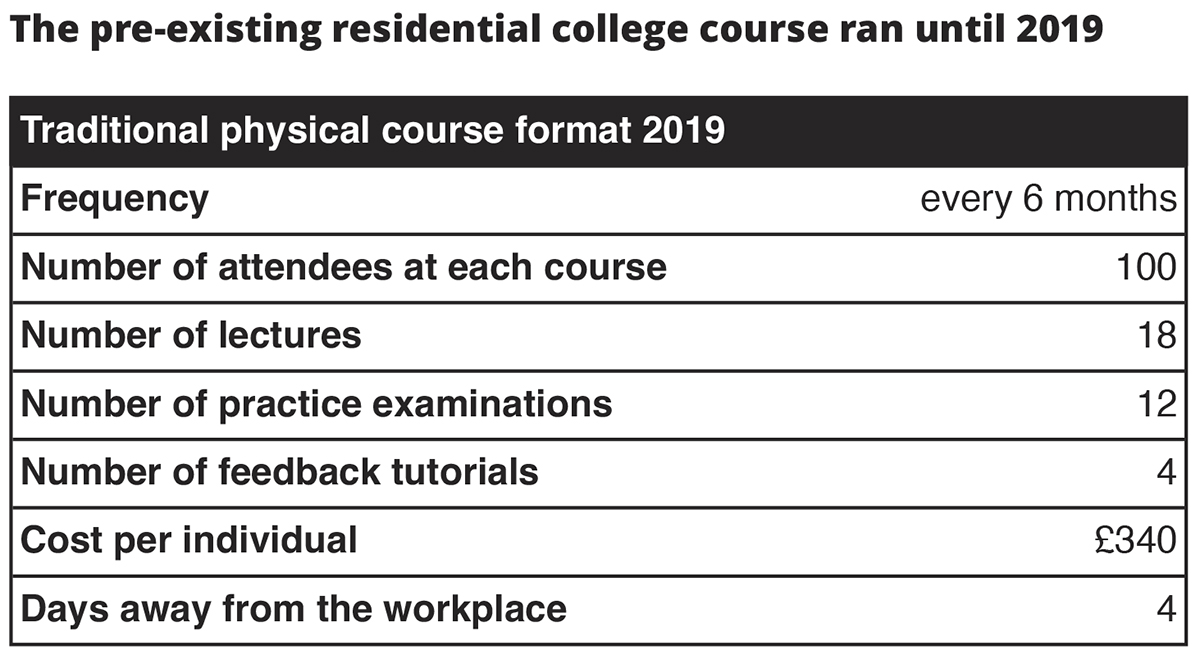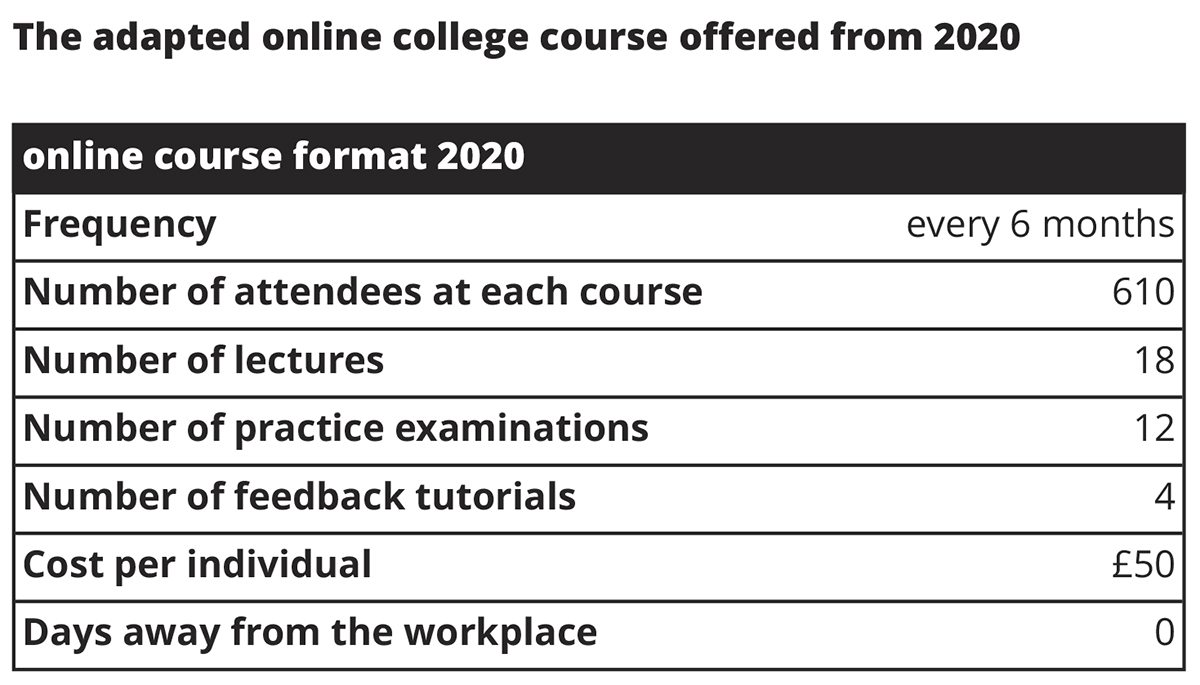Dr Andrew McIndoe MBE & Dr Ed Hammond MBE chart the rapid and successful adaptation of delivery of a national teaching programme to the COVID-19 pandemic
Anaesthetists and intensive care doctors are currently in short supply across the UK. After leaving medical school with a basic medical degree, these specialists train for a further seven to 10 years and are required to pass at least two rigorous postgraduate Medical Royal College examinations before acceptance onto the General Medical Council (GMC) specialist register. Only then can they apply for UK consultant posts.
As well as overseeing the apprenticeship style training at a local and regional level, the Royal College of Anaesthetists provides national revision courses that have traditionally been delivered centrally by expert tutors over a four-day residential intensive course at the College in London. The workforce numbers in training are carefully regulated by the Department of Health and Social Care to maintain an appropriate number of consultants. It is, therefore, vital that trainees were in some way allowed to progress with training despite intense clinical pressures and the lockdown restrictions imposed by the COVID-19 pandemic.
How the course adapted to COVID-19 and intense clinical pressures
On average, 100 candidates attended the existing twice-yearly college examination training course each time it ran in 2018 to 2019. Each candidate paid £340 in course fees, required four days leave of absence from the workplace and their sponsoring Trust was required to pay travelling expenses and four to five nights’ accommodation in London to allow each candidate to attend in person.

The four-day course ran from 9 am to 6 pm, comprising 18 lectures which lasted 60 to 90 minutes, 12 multiple-choice questions (MCQ) mock exams and four tutorial and exam feedback sessions. Each mock exam was focused on topics covered in individual lectures and was completed by candidates before the lectures scheduled for that day. Individual scores and ranking against the rest of the trainee cohort were then presented back to candidates so they could compare their individual performance against that of their colleagues. The mock exams with answers and explanations were made available after the course through the award-winning online resource e-Learning Anaesthesia (e-LA) for candidates to re-take in their own time, should they wish to, after completion of the course. Access to e-LA, which is hosted on the Health Education England e-Learning for Healthcare Hub, via the course also provided specific links to an extensive background revision resource library of articles published in BJA Education and core e-learning sessions referenced to subjects covered in the course lectures.
The course budget revenue, which derived from 100 candidates paying the course fee of £340, covered venue costs, faculty travelling expenses to London, consumables and College operating and staff costs.
The new course was developed for online, on-demand delivery in response to an expectation that clinical pressures and rising staff sickness levels during the pandemic would make it very difficult for Trusts to honour study leave commitments that required absence of trainees from the workplace for teaching purposes. Where possible, it was modelled on the successful format of the face-to-face course.

The course was divided into two phases. In phase one the 12 MCQ mock exams were released in an interactive online format through e-LA in advance of the lectures themselves being made available in phase two which opened two weeks later. This replicated the face-to-face format and ensured that candidates attempted the mock exams before they had access to the lectures therefore enabling the ranking process to take place fairly.
In phase two, the 18 original core lectures were split into smaller topics and recorded as bite-sized video lectures, which made it easier for trainees to navigate, and to access individual topics traditionally covered in the longer face-to-face lectures. The tutorial sessions on how to approach single best answer questions with examples were adapted for online delivery using on-screen questions presented in stop motion “pause the video now” fashion while candidates considered their response. After submitting their answer, the correct response was revealed, and the other options were analysed and discussed in greater depth. This approach worked extremely well and had the added advantage of allowing candidates to work entirely at their own pace without being pressured to make rash decisions or to move on before being confident that they understood the arguments, as they might have done in the group environment.
The cost of the course was reduced to £50, and resources were made available for the duration of the trainees’ exam preparation period right up to the real College examination date.
The course was supported interactively using a social media platform called Yammer® where trainees had direct access to the lecturers and tutors to ask questions. A series of live webinars were delivered out of hours to facilitate attendance if trainees were required to work daytime shifts while ‘attending’ the online course. Microsoft Yammer is a private access social networking/media platform that integrates with Microsoft Teams and is accessible via a mobile or desktop app after approval of the individual’s email address. It can, therefore, be used very successfully to facilitate real-time two-way private communication between trainees and facilitators while interacting with the other online modalities of the course.
As the course was online-only, there was no restriction to the number of trainees who could attend and 610 trainees registered and were accepted onto the first online iteration course.
Analysis of the effects of changing the Royal College of Anaesthetists’ examination training course to an online format:
- Course delivery was maintained at a time when local resource pressures and shortages threatened attendance by both faculty and trainees.
- Expanded access to the course (both in terms of numbers and expense).
- Reduced cancellation rate as access was maintained for trainees and faculty required to self-isolate due to COVID-19 exposure.
- Elimination of unnecessary absence from the workplace for trainees and tutors at a time of resource shortage.
- Elimination of the threat of inter-regional transfer of COVID-19 infection by asymptomatic carriage and infection while attending a large central venue.
- More efficient use of regional and Trust study leave budgets by reduction of the burden of travel and subsistence costs.
- Flexibility for tutors to archive their contributions at a convenient time and to deliver teaching and feedback even when isolating.
- Creation of an archived resource available to trainees to access right up until examination.
- Ability to keep secure lines of communication open between trainees and tutors via the social networking platform, to facilitate help with questions right up until the candidate sat the examination.
- Integration of blended learning that facilitated reflection and paced learning by trainees.
- Reduced costs and overheads overall for running this course in the future.
- Further integration and introduction of existing e-learning resources into trainees’ awareness of learning resources that were available to them.
We have successfully adapted an extremely well-regarded national residential specialist training course for online delivery with minimal expenditure. The blended use of recorded video, stop-start interaction, private access social media, and the e-LA interactive examination resource has allowed us to extend and to widen delivery of the course by 510% at a time when absence from the workplace was severely curtailed for most UK trainees. This is an extraordinary achievement and was achieved within the existing budget but at a significantly reduced financial cost to individual trainees and their parent Trusts.
*Please note: This is a commercial profile











